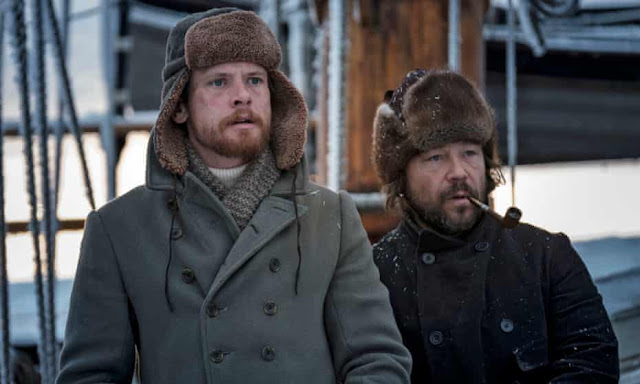 |
| Jack O'Connell and Stephen Graham in The North Water. |
Set in the 1860s on an English whaling ship that meets disaster in Arctic waters, the limited series The North Water (on AMC+) finds extraordinary beauty in a staggeringly grim narrative. The writer-director is Andrew Haigh, one of the most gifted of the current crop of British filmmakers. Haigh helmed the half-hour HBO series Looking, about a trio of gay men living in San Francisco, which culminated in a very fine TV movie; for the big screen he’s directed 45 Years with Tom Courtenay and Charlotte Rampling, about a four-and-a-half-decade marriage that is disrupted by an unexpected remnant of the husband’s past, and Lean on Pete, perhaps the most unusual film I’ve ever seen about the relationship between a boy and a horse. His taste runs to the stark; even Lean on Pete falls into that category. And The North Water, which Haigh adapted from a 2016 novel by Ian McGuire, is truly brutal. The protagonist is Patrick Sumner (Jack O’Connell), who signs on as ship’s surgeon after his military experience in India goes sour and wrecks a promising career in medicine. Sumner arrives on board haunted by nightmares as well carrying an opium jones, yet he turns out to be the most salvageable of the main characters. Both the captain, Brownlee (Stephen Graham), and the first mate, Cavendish (Sam Spruell), are privy to the scheme of the ship’s owner, Baxter (Courtenay), to take the ship, The Volunteer, into ice-bound northern waters with the aim of destroying it for the insurance. And Cavendish’s companion, Henry Drax (Colin Farrell), is a sadistic brute who rapes and kills the ship’s cabin boy (Stephen McMillan) and then frames a fellow sailor for his murder.
The story moves from violence to violence, hardship to hardship, but I never considered for a moment not watching it through. Haigh envelops the five episodes in a tragic vision of startling immensity and depth, and he’s developed a rare feeling for environment and a superlative compositional sense. (The series was shot on location in the Arctic; the cinematographer, Nicolas Bolduc, does exquisite work with the landscape.) A horrifying seal clubbing scene has the breadth and power of a great late-eighteenth or early-nineteenth-century canvas, while it sounds the plaintive notes of a despairing naturalist. The struggles of the small group of sailors who opt to fight their way through the winter rather than move on after The Volunteer sinks suggest classic adventure tales of men battling the elements with Conradian undercurrents of irony and fatalism. Haigh lingers on the ship as it breaks apart like a toy; I felt as if I couldn’t breathe until it had disappeared beneath the frosted crust of ice.
The entire cast, including Peter Mullan as a priest living among the Inuit who rescues Sumner, is first-rate. Farrell gives a terrifying performance. He’s bulked up and as physically overwhelming as a monster in a fairy tale, but the actor and the director make sure that we never make the mistake of imagining that he’s not fully human. (Farrell even manages to give Drax some humor and, believe it or not, some warmth.) He commits his most shocking atrocity with a walking stick, turning a banal prop that we usually associate with comfort and charity into a lethal weapon. But O’Connell has the leading role, and he plunges in it up to the neck. In Starred Up and Unbroken I found O’Connell’s forcefulness unvaried and uninteresting; he seemed to be substituting athletic commitment for acting. But here he makes the transition. In the series’ most amazing sequence, Sumner tracks a polar bear in a storm, shoots it and takes shelter inside its corpse. I thought of the unforgettable scene in Jan Troell’s The New Land where Max von Sydow’s character saves his little boy’s life in a surprise Minnesota snowfall by hacking an ox apart and placing the boy in its warm blood, but this encounter in The North Water is also about something much darker than survival, and I’ve never seen anything quite like it. (Of course it’s impossible not to think, by contrast, of the ridiculous interaction between Leonardo DiCaprio and the bear in The Revenant. Episode 4 of The North Water should be required viewing for Alejandro Iñárritu.)
We’ve in an era where even movie lovers know by name only a handful of directors; even if a lot of people happened upon The North Water – which is unlikely, since it’s on neither Prime or Netflix – it wouldn’t bring Andrew Haigh to distinction. But it must be said that he’s a wonderful filmmaker who consistently seeks to bring to light material that he obviously believes in and to handle it with the utmost seriousness of purpose. At a time when critics as well as audiences confuse editorializing with making art, he’s behaving like a true artist.
 – Steve Vineberg
is Distinguished Professor of the Arts and Humanities at College of the
Holy Cross in Worcester, Massachusetts, where he teaches theatre and
film. He also writes for The Threepenny Review and is the author of
three books: Method Actors: Three Generations of an American Acting Style; No Surprises, Please: Movies in the Reagan Decade; and High Comedy in American Movies.
– Steve Vineberg
is Distinguished Professor of the Arts and Humanities at College of the
Holy Cross in Worcester, Massachusetts, where he teaches theatre and
film. He also writes for The Threepenny Review and is the author of
three books: Method Actors: Three Generations of an American Acting Style; No Surprises, Please: Movies in the Reagan Decade; and High Comedy in American Movies.
No comments:
Post a Comment